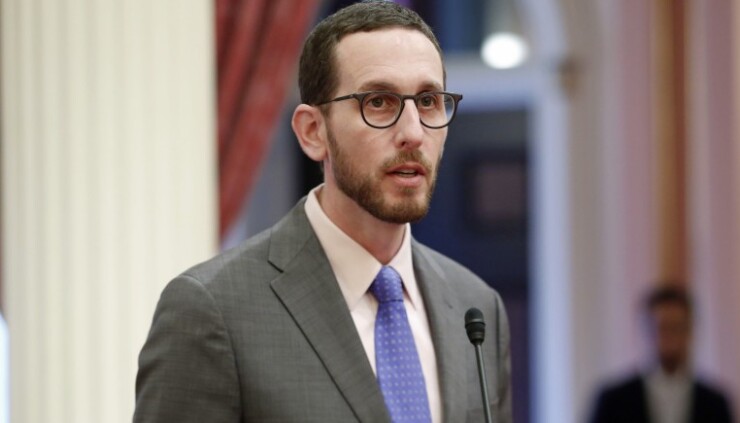
If two transit-related bills approved by California lawmakers are signed by Gov. Gavin Newsom, it would be credit positive for the state's transit agencies, and particularly those in the San Francisco Bay Area, Moody's Ratings analysts said.
If Newsom signs Senate Bills 79 and 63 it would reinforce the state's support for public transit, Moody's analysts wrote in a report published Thursday.
SB 79, authored by Sen. Scott Wiener, D-San Francisco, is a housing bill that allows for high-density multi-family housing development within a half-mile of transit stops regardless of existing zoning laws. It aims to reduce the state's housing crisis and encourage transit use.
"We sent legislation — SB 79 — to the governor to allow more homes near high quality transit," Wiener said on Friday in an
The legislation would also allow transit agencies to develop their own land around bus and train stations, a potential revenue source.
Wiener first introduced similar legislation in 2018, and again in 2020 and 2022, before finally getting it approved by both houses.
The bill, according to Moody's, is similar to measures approved in
"While the housing market may take time to respond, the long-term credit implications of this regulatory change to California transit agencies, the state and surrounding local governments would be broadly positive," Moody's analysts wrote. "Building dense housing near transit hubs can increase transit ridership and utilization, improve farebox revenue and strengthen the financial position of transit agencies."
This legislation, and the broader effort to lessen the state's housing crisis, could make it easier to afford a home and alleviate the negative affect the affordability crisis has on the state's demographic, economic and finances, Moody's wrote.
SB 63 presents an opportunity to
If approved by voters, the sales tax would be credit positive for Bay Area transit systems, said Moody's, because those transit systems, which collectively serve one-third of the state's transit riders, face a combined structural funding gap exceeding $860 million starting in fiscal 2027.
"A dedicated revenue enhancement would aid financial predictability, help sustain services and support long-term capital planning for the San Francisco Municipal Transportation Agency, SFMTA; San Francisco Bay Area Rapid Transit District,
Without sustainable new revenue, key Bay Area transit agencies risk substantial service cuts, which could trigger a "credit negative feedback loop," because reduced service can diminish ridership, weaken financial metrics and over the long-term, strain asset conditions, Moody's said.
BART, for example, has stated it would "consider a 70% cut in train dispatches, closure of 10 stations and an end to evening service if significant new funding was not available to it by fiscal 2027," Moody's said. Heavy rail systems like BART have higher maintenance costs than bus-only services like AC Transit, and would have to make steeper cuts, according to the rating agency.
Diminished transit services could also affect economic conditions for local governments, Moody's wrote.
Newsom has until Oct. 12 to sign or veto bills approved by the state legislature.





